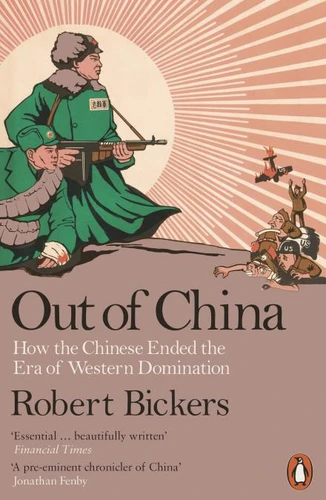Out of China. How the Chinese Ended the Era of Western Domination
Par :Formats :
Disponible dans votre compte client Decitre ou Furet du Nord dès validation de votre commande. Le format ePub protégé est :
- Compatible avec une lecture sur My Vivlio (smartphone, tablette, ordinateur)
- Compatible avec une lecture sur liseuses Vivlio
- Pour les liseuses autres que Vivlio, vous devez utiliser le logiciel Adobe Digital Edition. Non compatible avec la lecture sur les liseuses Kindle, Remarkable et Sony
- Non compatible avec un achat hors France métropolitaine
 , qui est-ce ?
, qui est-ce ?Notre partenaire de plateforme de lecture numérique où vous retrouverez l'ensemble de vos ebooks gratuitement
Pour en savoir plus sur nos ebooks, consultez notre aide en ligne ici
- Nombre de pages576
- FormatePub
- ISBN978-1-84614-619-0
- EAN9781846146190
- Date de parution30/03/2017
- Copier Coller02 page(s) autorisée(s)
- Protection num.Adobe DRM
- Infos supplémentairesepub
- ÉditeurPenguin
Résumé
SHORTLISTED FOR THE 2018 WOLFSON HISTORY PRIZEThe extraordinary and essential story of how China became the powerful country it is today. Even at the high noon of Europe's empires China managed to be one of the handful of countries not to succumb. Invaded, humiliated and looted, China nonetheless kept its sovereignty. Robert Bickers' major new book is the first to describe fully what has proved to be one of the modern era's most important stories: the long, often agonising process by which the Chinese had by the end of the 20th century regained control of their own country.
Out of China uses a brilliant array of unusual, strange and vivid sources to recreate a now fantastically remote world: the corrupt, lurid modernity of pre-War Shanghai, the often tiny patches of 'extra-territorial' land controlled by European powers (one of which, unnoticed, had mostly toppled into a river), the entrepôts of Hong Kong and Macao, and the myriad means, through armed threats, technology and legal chicanery, by which China was kept subservient.
Today Chinese nationalism stays firmly rooted in memories of its degraded past - the quest for self-sufficiency, a determination both to assert China's standing in the world and its outstanding territorial claims, and never to be vulnerable to renewed attack. History matters deeply to Beijing's current rulers - and Out of China explains why.
Out of China uses a brilliant array of unusual, strange and vivid sources to recreate a now fantastically remote world: the corrupt, lurid modernity of pre-War Shanghai, the often tiny patches of 'extra-territorial' land controlled by European powers (one of which, unnoticed, had mostly toppled into a river), the entrepôts of Hong Kong and Macao, and the myriad means, through armed threats, technology and legal chicanery, by which China was kept subservient.
Today Chinese nationalism stays firmly rooted in memories of its degraded past - the quest for self-sufficiency, a determination both to assert China's standing in the world and its outstanding territorial claims, and never to be vulnerable to renewed attack. History matters deeply to Beijing's current rulers - and Out of China explains why.
SHORTLISTED FOR THE 2018 WOLFSON HISTORY PRIZEThe extraordinary and essential story of how China became the powerful country it is today. Even at the high noon of Europe's empires China managed to be one of the handful of countries not to succumb. Invaded, humiliated and looted, China nonetheless kept its sovereignty. Robert Bickers' major new book is the first to describe fully what has proved to be one of the modern era's most important stories: the long, often agonising process by which the Chinese had by the end of the 20th century regained control of their own country.
Out of China uses a brilliant array of unusual, strange and vivid sources to recreate a now fantastically remote world: the corrupt, lurid modernity of pre-War Shanghai, the often tiny patches of 'extra-territorial' land controlled by European powers (one of which, unnoticed, had mostly toppled into a river), the entrepôts of Hong Kong and Macao, and the myriad means, through armed threats, technology and legal chicanery, by which China was kept subservient.
Today Chinese nationalism stays firmly rooted in memories of its degraded past - the quest for self-sufficiency, a determination both to assert China's standing in the world and its outstanding territorial claims, and never to be vulnerable to renewed attack. History matters deeply to Beijing's current rulers - and Out of China explains why.
Out of China uses a brilliant array of unusual, strange and vivid sources to recreate a now fantastically remote world: the corrupt, lurid modernity of pre-War Shanghai, the often tiny patches of 'extra-territorial' land controlled by European powers (one of which, unnoticed, had mostly toppled into a river), the entrepôts of Hong Kong and Macao, and the myriad means, through armed threats, technology and legal chicanery, by which China was kept subservient.
Today Chinese nationalism stays firmly rooted in memories of its degraded past - the quest for self-sufficiency, a determination both to assert China's standing in the world and its outstanding territorial claims, and never to be vulnerable to renewed attack. History matters deeply to Beijing's current rulers - and Out of China explains why.





